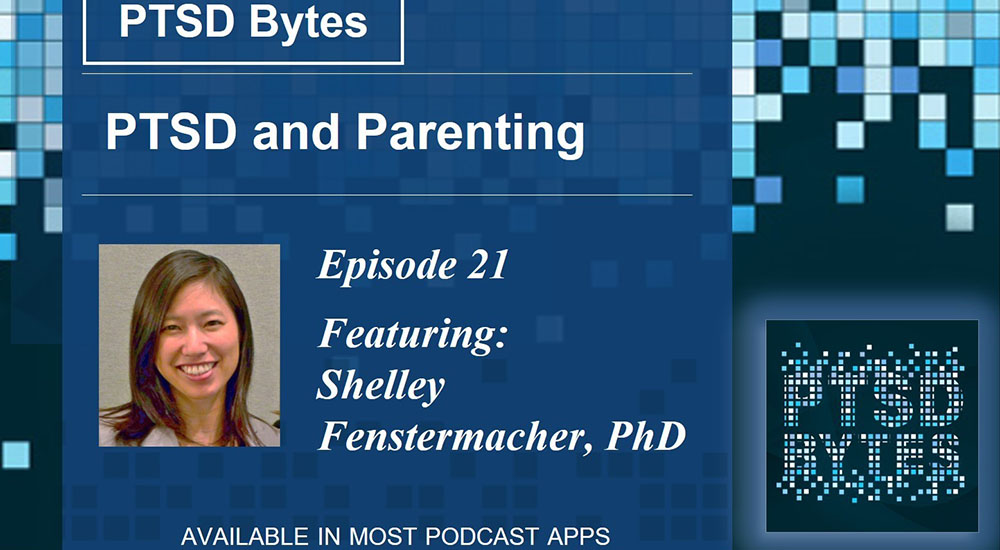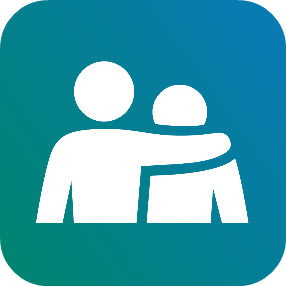In this episode of the PTSD Bytes podcast, Dr. Pearl McGee-Vincent discusses PTSD and parenting with Dr. Shelley Fenstermacher, psychologist at VA’s Office of Mental Health and Suicide Prevention.
Listen to this episode, here: https://www.spreaker.com/user/11014928/forreview-ncptsd-episode21-fenstermacher.
Many Veteran parents with PTSD are raising their kids just fine. But parenting can be difficult for everyone. And as a parent living with PTSD, you may find yourself struggling with intense emotions, withdrawal or avoidance, and difficulty connecting with your children. These symptoms can make parenting a real challenge and impact the whole family.
There are steps you can take to help manage your symptoms while still providing a supportive and loving environment for your children.
Learn more
Learn more about how PTSD affects your parenting. The National Center for PTSD’s article “When a Child’s Parent has PTSD” explains how your symptoms may impact your children and what your children might need from you. Dr. Fenstermacher notes that this information applies to anyone in a parenting role, not just biological parents.
You can also listen to the stories of other Veteran parents with PTSD and their experiences raising children. The free online self-help course “Parenting for Veterans” features short video clips of Veteran parents sharing their stories and offers tips for navigating parenting with PTSD.
Take care of yourself
Caring for children can be incredibly demanding and it’s important to give yourself a break. Every parent needs a chance to refuel both physically and mentally. Taking time for yourself can help you to better manage your PTSD and will allow you to be more present for your kids.
The free mobile app, PTSD Family Coach, provides information and tips about parenting. It also has tips for children whose parents have PTSD.
Talking to your children about PTSD
If you decide to talk to your children about your PTSD, the free booklet “A Veteran’s Guide to Talking with Kids about PTSD” can help you prepare for these conversations. You do not have to share with your children about the trauma you experienced. Instead, you can focus on how you’re doing now. Be honest and supportive—let your children know that they’re not to blame for your PTSD symptoms.
Choose a booklet based on your children’s ages from the Veteran Parenting Toolkit to learn more about age-appropriate ways to talk about PTSD. For example, younger children have shorter attention spans, so conversations should be kept short.
Seek help
VA offers evidence-based treatment for Veteran parents with PTSD. Find help with VA’s PTSD treatment locator. You can also inquire at your local Vet Centers as many also offer specialized services for Veterans and families dealing with PTSD.
Navigating parenting with PTSD can be difficult. With the right resources and support, you can take care of your PTSD and nurture your children. As Dr. Fenstermacher says, “Every day is another opportunity for parents and kids to connect.”
Additional links
- National Child Traumatic Stress Network: nctsn.org
- Sesame Street for Military Families: https://sesamestreetformilitaryfamilies.org/
- UCLA FOCUS Project (resilience training for military families): https://focusproject.org/
- More PTSD Bytes episodes
If you are a Veteran who is experiencing a crisis or supporting a loved one who is, dial 988 then press 1 for immediate assistance, or chat online at VeteransCrisisLine.net/chat.
Topics in this story
Link Disclaimer
This page includes links to other websites outside our control and jurisdiction. VA is not responsible for the privacy practices or the content of non-VA Web sites. We encourage you to review the privacy policy or terms and conditions of those sites to fully understand what information is collected and how it is used.
More Stories
Bob Jesse Award celebrates the achievements of a VA employee and a team or department that exemplifies innovative practices within VA.
The Medical Foster Home program offers Veterans an alternative to nursing homes.
Watch the Under Secretary for Health and a panel of experts discuss VA Health Connect tele-emergency care.








I think all of this departure from real one on one counseling is a sad and bad thing. I am a 100 percent disabled Veteran; I have 100 percent disability for the PTSD. I also have 90 percent disability for hearing loss. I have 60 percent for heart condition. I have Parkinsons and take medication for it without ever being claimed, it is a presumptive condition. I have tried for years now, 3 years to get one on one counseling and it has been denied. The VA pushes the buttons of video and telephone which I cannot do. The VA claims they are helping more people “VETERANS” it is a lie that cannot be denied. I have three groups of people that I serve that all complain about the lack of care put forward by the VA on mental health. SAD day in this country that our own government openly lies to the VETERANS about care.
Thank you for sharing with us. We are sorry that you have had these experiences. We do not provide direct clinical care at the National Center for PTSD but we do have a couple recommendations for you. First, you can speak with the patient advocate at your VA Medical Center. They can work to address your concerns by acting as a liaison between you and your care team. Get in touch with them by calling your local VA Medical Center and asking for a patient advocate. There is also a national VA hotline that investigates Veterans’ complaints concerning their VA health care. That number is 1 (800) 488-8244. We hope this information helps.